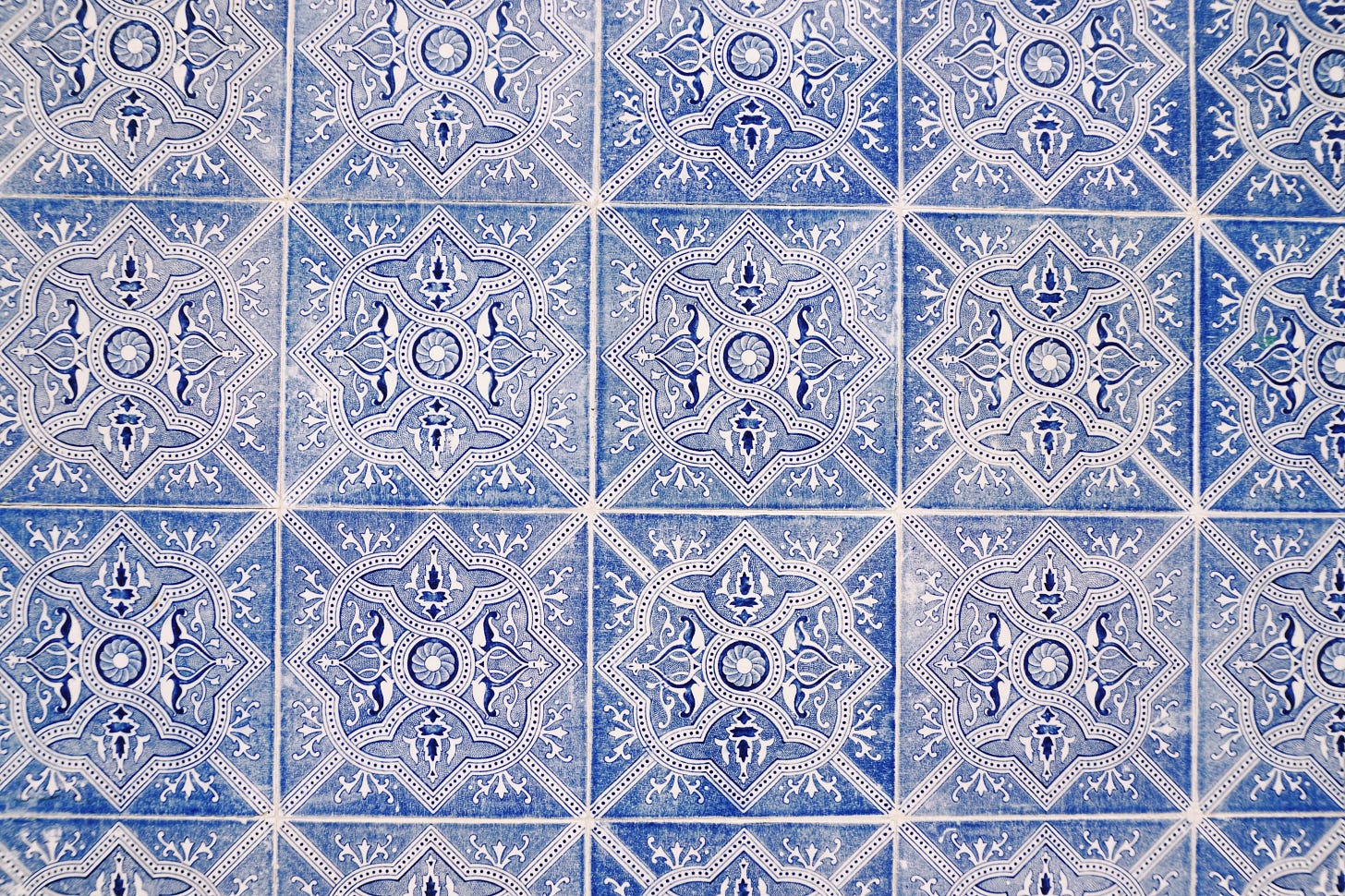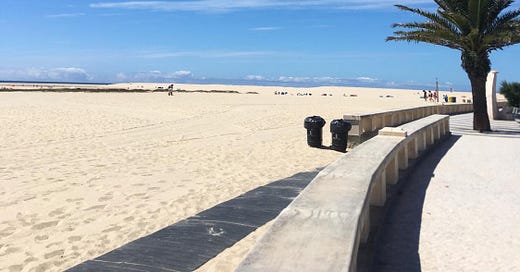I’ll admit it. When I came to Portugal, I was half expecting it to be some version of Italy-lite, a little bit rococo with a fado guitar and a dash of salted cod, perhaps. These were fleeting and nebulous thoughts, nothing concrete, and I left myself open to the experience without too many preconceptions. It’s my preferred method of travel: full immersion, take it in without judgment, don’t compare.
But comparisons were inevitable, at least at first. I expected Portugal to be old in the way that Italy is old, all crumbling Roman villas overrun by wild roses, medieval villages perched precariously atop hills, a cloudburst here, a church bell there. The whole Italian opera.
But it’s not.
Sure, Portugal has beautiful old cities, many of them decorated in azulejos, the distinctive blue glazed tile that Portugal is famous for, but in coastal towns such as Foz do Arelho, where I spent the majority of my time, if you squint, you might think you were in Newport Beach, California. The houses are of recent construction, most painted white or a light pastel, all with red-tile roofs. But these aren’t the red-tile roofs of Italy, mellowed with age and splotched with lichen and yellow stonecrop. They are starkly new, and yes, that surprised me.

With 60 million residents, Italy is a crowded country. You feel it. Portugal, clocking in at 10 million residents, is not. With so much uninhabited space, I was at times reminded of west Texas, especially since the topography around Lisbon is scrubby and dry until you get to Caldas da Rainha (the name means “Queen’s Baths,” a reference to the city’s restorative waters) where groves of eucalyptus grow. The weather is perfect in the way of my native Southern California, warm and dry, buffeted by cooling coastal trade winds, rarely getting above 72 degrees Fahrenheit.
If weather were a scoreboard, and it was Italy versus Portugal, Portugal wins, hands down.
Considering its bloody history and aggressive imperialism, I was surprised the country was as chill as it is. Not once did I see a display of testosterone poisoning, which I can assure you Italy has in abundance. It’s quiet here. Maybe too quiet, for some. For me, it’s a blessed relief from the perpetual motion machine of Italy, where no one has an “indoor voice,” and piazzas throb with bad pop music until the wee hours of the morning.
Italy is noisy. Portugal is not.
To be fair, some of that quiet is due to the fact that a lot of retired people live here. Portugal’s slower pace of life is fabulous when you’re sitting at a café overlooking the water, but less fabulous if you have even one shred of ambition. Portugal is not a good place for ambition. Frankly, I hate ambition. I think it’s poisonous. Italy, too, is not the right place for people who have Big Ideas. But the absence of any discernible edge, even in the capital city of Lisbon, gives Portugal a dream-like quality that borders on the surreal. The ease with which I adapted to it says more about my age and state-of-mind these days than I want it to.
Life is hard. I’m tired. Sometimes, I just want to stare at the water.
And there is plenty of it to be had. It’s cold water, mind you. The Atlantic ain’t the Mediterranean, which is a lot warmer. But the powdery beaches, blue waves, and even bluer skies more than make up for it. Frankly, I was besotted. Italy’s beaches, lovely though they can be, are often packed, hot, privately owned, expensive, and over-built. The last time John and I went to Tarquinia, which is in the Lazio region of Italy, we took one look at all the shouting beachgoers and turned around.
That’s not relaxing. This is relaxing:
And it’s but a short drive from the coastal splendor of Portugal to wonders like this one: the Alcobaça Monastery founded in 1153 following the wresting of the nearby city of Santarém from the Moors. You would be hard pressed to find a more awe-inspiring example of Manueline, or Portuguese late-Gothic architecture. Where the Italian Renaissance church builders gilded, marbleized, painted, and stain-glassed every square inch of their temples of worship, the Portuguese raised their ceilings another fifty feet and let the magnificence of light and stone and architecture bring the faithful closer to their god. Largely funded by Portugal’s lucrative spice trade in the 16th century, the Monastery of Alcobaça manages to overwhelm you with a sense of your own paltry significance (the avowed purpose of all medieval and Renaissance churches) but without coldness or austerity.
No mean feat.
That’s Portugal
Portuguese food is, perhaps, not the most flavorful. In this, Italy has the advantage. For every one Portuguese restaurant outside of Portugal or its colonies (admittedly, not many), there must be 200 Italian ones. In fact, I don’t think I’ve ever seen a Portuguese restaurant outside of Portugal. Italian food is popular for a reason: it’s delicious. Portuguese food is fish-intensive, insufficiently seasoned, and a tad unvarying. There might be dissenting opinions on this, but I am hardly an outlier.
Equally prevalent is the belief that Brazilian Portuguese is softer and more mellifluous than European Portuguese. Don’t tell a European Portuguese speaker that, however. And don’t speak Spanish to one either. There is strong historical precedent for why such opinions might be considered insulting.
There are, of course, other cultural adjustments to make. Unlike Italy, Portugal doesn’t have any autovelox, or speed meters. Portuguese can and do speed, drive aggressively, and tailgate, just like Italians. But try breaking any traffic circle laws, and you will not only have a Portuguese cop pulling you over, you will be surprised when he demands immediate payment. Don’t have the money? He’ll follow you to the nearest ATM. Don’t have enough money? He’ll take you to jail until someone posts bail. Having said that, you won’t have to bribe police to get home. This is just standard operating procedure.
Per Transparency International’s 2021 Corruption Perceptions Index (and mind you, these are just perceptions, not necessarily facts), Portugal was ranked 32nd out of 198 countries for corruption. Almost all Portuguese nationals complain about it. Between Italy and Portugal, I’ll leave it to you to decide who wears it best.
For me, Portugal is already a flavor I love. It started out one way, but as I let it sit on my tongue a while, I discovered a toothsomeness I wasn’t expecting. It’s a country that spent more than forty years (1933 until 1974) under António de Oliveira Salazar’s dictatorship, which ended in a bloodless coup called the Carnation Revolution. It is poor, but with 63.64% of its energy coming from renewables and a strong presence in the manufacture of wind turbines, there is reason to hope that will not always be the case.
Portugal is a proud country, and it is singular. With over a thousand miles of coastline, it bore centuries of hostile invasion, learning to adapt, adopt, and repel. During its Age of Discovery, it sent her sons and daughters to all corners of the globe, only to receive them back again richer than before.
I, for one, am eager to know more.
Copyright © 2022 Stacey Eskelin
Tell me what you think! Leave your thoughts in the comments section below.








A long-time resident of Italy, I visited Portugal for the first time this summer and I find your observations spot on. Portugal has a "sleepiness" about it that I did not expect. It was surprisingly clean and I felt that all the tourist services typically lacking in Italy were readily available. I also found the Portuguese to be incredibly generous, patient and kind. It was just EASY to be there. I hope to get back and visit more of the coastal areas.
Portugal has always been on my bucket list. This only makes me want to go more. I love quiet and peaceful, which is one reason I've never been keen on going to Italy. Your description of Portugal sounds like Cyprus, which I loved for it's quiet beauty, even if its political situation was a bit screwy.